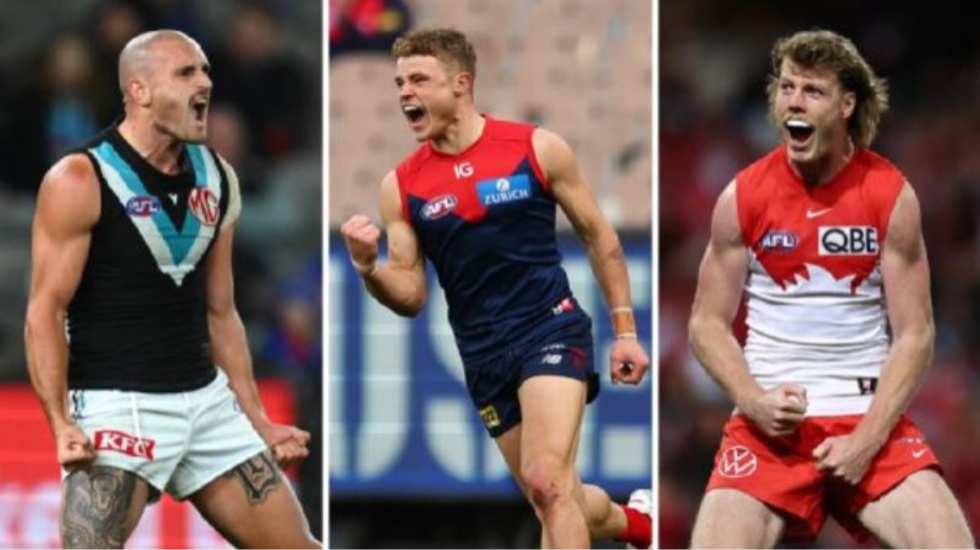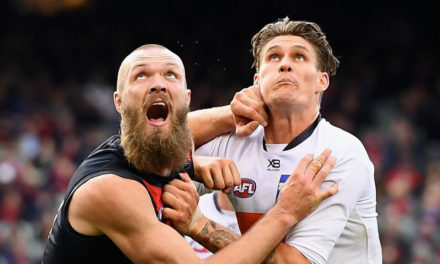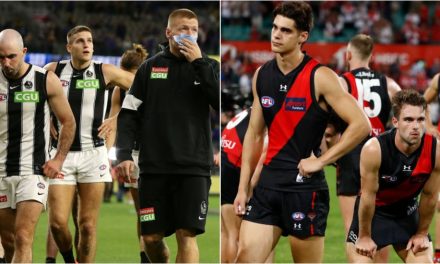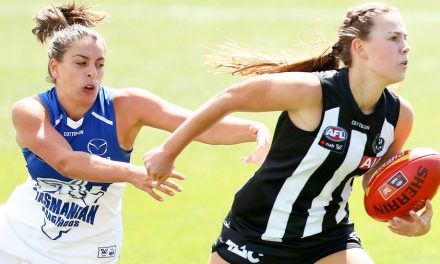(From left): Sam Powell-Pepper, Kyle Chandler and Nick Blakey could all have a huge impact for their teams. Picture: ESPN
Call them the superstars, the “usual suspects”, but we all have a fair idea who the biggest names in this week’s first four AFL finals are, and of what they are capable.
Big games from the big names will be expected, poor performances would be the obvious explanation for defeat. But so often in finals, it isn’t necessarily the lead actors alone who win or lose the battle.
It is the support cast, those players you know are capable of performing on the biggest stage, but without quite the same expectations hanging over them, who might well end up having the biggest say in whether teams win or lose on the biggest of stages.
Is it the ubiquitous “x-factor”? Is it the players whose “best will ensure your team wins”? Whatever term we decide to use, the following players at each of the eight finalists could arguably prove even more critical to outcomes for their teams than the household names.
Here’s who we’re talking about…
JACK GINNIVAN (Collingwood)
The Magpies are solid enough in all areas, but there’s no doubt the loss of Nick Daicos has robbed them of a bit of flair lately. That’s where Ginnivan comes into the equation, albeit in a different role. The polarising small forward offers genuine spark. He also addresses one rare weak point for the Pies, which is groundball gets inside 50, for which Collingwood ranks a dismal 16th. Ginnivan seemed to turn a corner in that last-round thumping of Essendon with three goals and 17 disposals. And not coincidentally, they’ve also scored 100-points-plus in each of three games since his return to the senior line-up. Ginnivan could well be the difference between a competitive or not finals score for Collingwood.
ZAC BAILEY (Brisbane)
Brisbane is a potent scoring outfit, ranked second for average points per game this season behind only Adelaide. Obviously much of the attention for that revolves around Joe Daniher and Charlie Cameron, both with more than 50 goals this season, and Eric Hipwood, who’s kicked 39. But it’s the man who sits fourth on the Lions’ goalkicking list with 26 goals, Zac Bailey, who stands to play just as if not a more critical part in Brisbane’s finals push. Put simply, Bailey is the architect of so many of those Brisbane scores, his disposals near goal almost always leading to scoreboard damage. The Lions have scored 118 points from his intercept possessions this season (sixth in the competition) despite the fact Bailey’s 45 intercepts in total rank only 238th. If Bailey is busy forward of centre, Brisbane almost inevitably prevails.
SAM POWELL-PEPPER (Port Adelaide)
Much of the attention in the Power’s wonderful 2023 season has rightly been lavished upon wunderkids Zak Butters and Connor Rozee, along with ultra-reliable midfielder Dan Houston. But hard-as-nails pressure forward Sam Powell-Pepper is a major and undersold factor in Port’s potency, and it’s about more even than his 29 goals in 23 games, putting him third on the Power’s goalkicking charts. Powell-Pepper in one of only four general forwards in the competition this season to rate elite for groundball-gets inside 50 and at least above average for goals, score assists and tackles. Powell-Pepper does a bit of everything for Port close to goal, and his pressure is critical to Port locking the ball inside its scoring zone so effectively.
KYLE CHANDLER (Melbourne)
When Melbourne won the premiership in 2021, it had a fleet of players with relatively low profiles whose influence became more heralded the closer the Demons moved towards the flag. As history threatens to repeat itself, I keep seeing Kyle Chandler as the Dees’ latest incarnation of Alex Neal-Bullen. Chandler, like his more experienced peer, is a tireless runner and worker. His 24 goals from 21 goals put him fifth on Melbourne’s goalkicking table, but Chandler is also fifth among Demons for score involvements, and something of a Melbourne barometer. He averages 1.4 goals in the Dees’ wins and 0.6 in their losses, and for score involvements those respective numbers are 5.5 and 3.6. He mightn’t be a huge name, but if Chandler plays well in Melbourne’s finals, the Dees are a very good chance to get the result.
PLEASE HELP US CONTINUE TO THRIVE BY BECOMING AN OFFICIAL FOOTYOLOGY PATRON. JUST CLICK THIS LINK.
JESSE MOTLOP (Carlton)
When Carlton started 2022 in fine style, the work of small pressure forwards Matt Owies and Corey Durdin was pivotal. And when the Blues started motoring home this season after a poor start, this time it was another small forward in Jesse Motlop whose contribution started proving significant. Like Chandler at Melbourne, Motlop, too, has become something of an unlikely Carlton barometer. In the Blues’ wins, he averages 11.3 disposals, 1.9 goals and 5.8 score involvements. In their losses, those same numbers drop to 6.5, 0.6 and just 2.9. Motlop is fourth in the goalkicking with 22, but equally as important has been his tackling inside the forward 50, of which he’s recorded 28 to easily lead that statistic, the next highest Blue Owies and Lachie Fogarty with 18. If Motlop has a big night against the Swans, Carlton will more than likely win.
NASIAH WANGANEEN-MILERA (St Kilda)
St Kilda is the No.1 defensive team in the competition with good reason, but it ranks a lowly 15th for points scored. No team has ever won a premiership with a scoring profile that poor. And if the Saints are going to start hitting the scoreboard harder this September to give themselves a chance, the silky-skilled Wanganeen-Milera will be pivotal. His shift from a wing to half-back has been inspired and a major source of much of the attack St Kilda is able to generate. Wanganeen-Milera ranks third among the Saints for disposals, is equal third in uncontested possession and perhaps most tellingly, second for metres gained and fifth for score launches. All-Australian pair Callum Wilkie and Jack Sinclair lead this defence, but the Saints still won’t win if Wanganeen-Milera isn’t also one of their best on Saturday.
BRENT DANIELS (GWS)
The hard-working Giants’ small forward didn’t play a single game last year because of foot then hamstring issues, and after 62 games was threatening to be remembered only for one act, the checkside snap which gave GWS a last-second finals win over Brisbane in 2019. But Daniels’ renaissance has been stunning, and a big factor in the Giants’ consistent competitiveness in 2023. Daniels is the AFL’s third-highest rated general forward this season using AFL player rating points, and the only one of his type to rate elite for both forward half pressure and score involvements. Daniels has provided that menacing “hunter” type mentality which helped GWS turn around its ordinary start to the season after the Giants were 15th as late as Round 12.
NICK BLAKEY (Sydney)
In an up-and-down and at times injury-afflicted year for the Swans, running defender Nick Blakey was a rare constant, and not merely just by his presence. Blakey was an extremely reliable source of drive for Sydney off half-back, so much so he ended up narrowly missing All-Australian selection, part at least of the initial 44-man squad. He finished equal sixth in the AFL for rebound 50s, and second for running bounces. Blakey also became a genuine talisman of Sydney’s effort and effectiveness week to week, particularly when it came to intercept marks, in which he went at 68 per cent in Sydney’s wins, down to 33 per cent in the Swans’ losses, and kicking efficiency, an average of 5.8 in the Swans’ victories, just 2.9 in defeats. Blakey is an absolute key to Sydney’s hopes of causing a series of massive finals upsets.
This article first appeared at ESPN.











